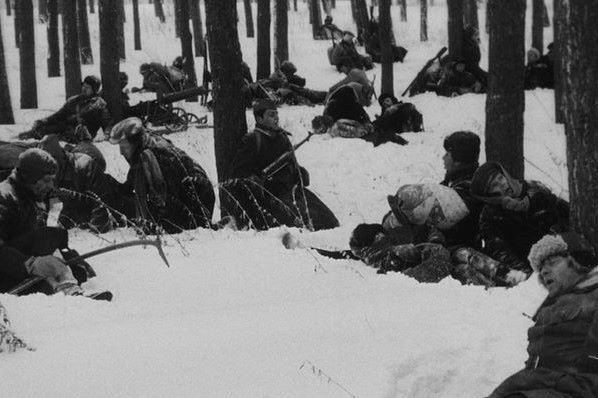It’s a arguable position that there is an inherent grim and dark hopelessness to much latter 20th century Soviet filmmaking, particularly that which is reflective on the second world war. However, in contrast The Ascent, the final film made by Russian director Larisa Shepitko before her tragic death at 41, showcases a bleak but nuanced comparative view on life, death, and sacrifice.
The film, based on Belarussian author Vasil Bykov‘s book, The Ordeal (also known variously as: Liquidation or Sotnikov) delves into the writer’s familiar territory; that of the conflict between the Soviet ideals and the practical realities, particularly during wartime in situations of great inner and outer conflict. It follows the travails of a pair of partisan soldiers, Ryback (Vladimir Gostyukhin) and Sotnikov (Boris Plotnikov), foraging for supplies in the depths of winter. The men are met with a series of difficulties, coming face to face with the unpalatable truths and the impermanence of moral convictions when confronted with the needs of duty clashing against situations of certain death. Their actions and inactions inevitably leading to their own capture and the real world implications of their own presence upon the lives of others.
It’s hard to talk about The Ascent without touching on its nature as an allegorical Passion Play. The clear and unavoidable similarities between the the latter half of the film, and the crucifixion are abruptly intentional, with Ryback, Sotnikov and Anatoly Solonitsyn‘s collaborating interrogator as unmistakable stand-ins for Christ, Judas and Pontius Pilate. It creates a resonance in the story that manages to lend weight to the events without ever feeling saccharine or twee.
It’s further interesting as this was hugely controversial for a film made and released in the USSR at the time, it’s a testament to Shepitko, and her husband and partner Elim Klimov‘s, connections both in the industry and arts, as well as in politics that the film was ever released. Even now it’s surprising to see a film this blunt coming out of the Soviet Union, particularly considering how meek and pro-Soviet films like Klimov’s own Come and See seem in comparison.
As is to be expected, this Criterion release has restored the image and sound of the production to a staggeringly crisp and beautiful point. With all the starkness of the impenetrable winter rendered in blinding whites offset with dark rich shadow. The additional materials mostly centre around Shepitko and her husband, which is fair considering the cross-pollination of their talents at this stage in her career, and the extent to which he helped cement and secure her legacy and legend after her death. Overall, it’s hard to imagine a better re-issue of such a distinct piece of late ’70s Eastern Bloc filmmaking.
Available on Criterion Collection Blu-ray from Mon 15 Feb 2021
